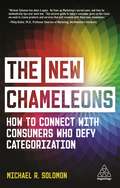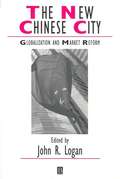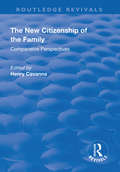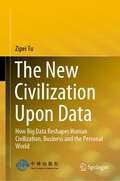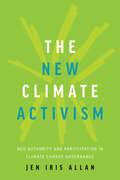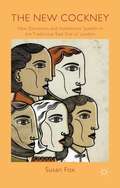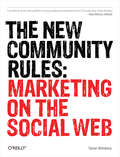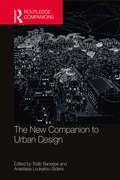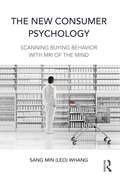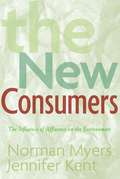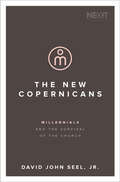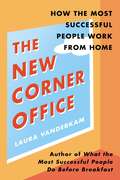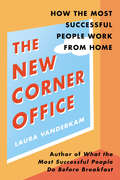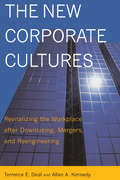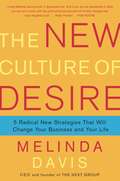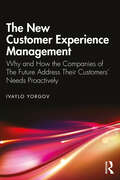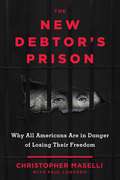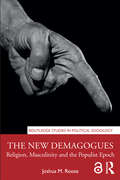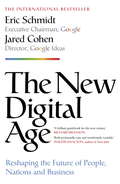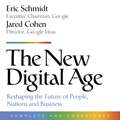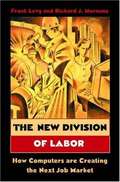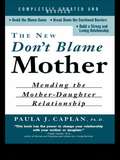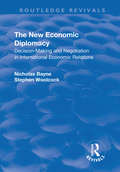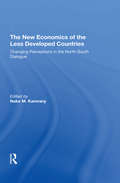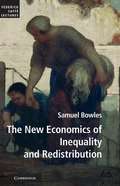- Table View
- List View
The New Chameleons: How to Connect with Consumers Who Defy Categorization
by Michael R. SolomonConsumers are changing but the marketing categories used to identify them have not. Engage with this new generation of consumers who increasingly take for granted that products and advertising will blend their multiple brand identities rather than market to them as a specific subculture. Male or female, work or play, online or offline. These and other market categories are no longer relevant as modern consumers defy traditional boundaries and identify as members of multiple subcultures. The New Chameleons reveals how to engage with this new generation and how to stand out among the competition. Global consumer behavior expert Michael R. Solomon directs marketers to move beyond their traditional categories and communicate with consumers as individuals rather than as a market segment. He explains how traditional marketing is based on the assumption of boundaries between us and them, the individual and the collective, producer and consumer, work and play, humans vs. computers, and editorial vs. commercial. He then shows how those boundaries are blurring: people identify with members of multiple subcultures; individuals seek collective advice before making a purchase; consumers no longer distinguish between purchases online or in-store; consumer-generated content becomes the norm; gender identity is fluid; gamification strategies turn work into play; and identity marketing becomes more popular. Combining history, data, experience and examples, The New Chameleons is written for every marketer (or reader) who wants to offer products and services that resonate with consumers now and in the future.
The New Chinese City: Globalization and Market Reform (IJURR Studies in Urban and Social Change Book Series #52)
by John R. LoganUrbanisation and urban development issues are the focus of this comprehensive account which introduces readers to the far-reaching changes now taking place in Chinese cities.
The New Citizenship of the Family: Comparative Perspectives
by Henry CavannaThis title was first published in 2000: This volume offers international comparative perspectives and critical analyses of the interconnections between family behaviour and its political regulation, the new economics of the family and the role of the family in building citizenship.
The New Civilization Upon Data: How Big Data Reshapes Human Civilization, Business and the Personal World
by Zipei TuThis book focuses on the changes which big data brings to human's society and personal thinking models. The author uses the concept of “data civilization” to reveal that we have entered a brand-new era on civilization level, which could be found and understood from three levels: human data civilization, commercial data civilization, and personal data civilization. There is no doubt data civilization will inevitably make a profound influence on the subversion and reconstruction of human beings including business, society, and thinking models. The book presents a unique perspective to understand the world which is dominated by data more and more.
The New Climate Activism: NGO Authority and Participation in Climate Change Governance
by Jen AllanAt the 2019 UN climate change conference, activists and delegates for groups representing Indigenous, youth, women, and labour rights were among those marching through the halls chanting "Climate Justice, People Power." In The New Climate Activism, Jen Iris Allan looks at why and how these social activists came to participate in climate change governance while others, such as those working on human rights and health, remain on the outside of climate activism. Through case studies of women’s rights, labour, alter-globalization, health, and human rights activism, Allan shows that some activists sought and successfully gained recognition as part of climate change governance, while others remained marginalized. While concepts key to some social activists, including gender mainstreaming, just transition, and climate justice are common terms, human rights and health remain "fringe issues" in climate change governance. The New Climate Activism explores why and how these activists brought their issues to climate change, and why some succeeded while others did not.
The New Cockney
by Susan FoxThe New Cockney provides a sociolinguistic account of speech variation among adolescents in the 'traditional' East End of London. The study takes account of the social and economic upheaval in the area since the 1950s, primarily concentrating on factors such as the immigration of the Bangladeshi community and its effect on the Cockney dialect. By paying attention to the particular, this book contributes to a better understanding of the more general concerns of linguistic variation. With a focus on the interaction and social practices of a group of adolescents attending a youth centre, the study highlights some of the possible mechanisms for language change.
The New Community Rules: Marketing on the Social Web
by Tamar WeinbergBlogs, networking sites, and other examples of the social web provide businesses with a largely untapped marketing channel for products and services. But how do you take advantage of them? With The New Community Rules, you'll understand how social web technologies work, and learn the most practical and effective ways to reach people who frequent these sites. Written by an expert in social media and viral marketing, this book cuts through the hype and jargon to give you intelligent advice and strategies for positioning your business on the social web, with case studies that show how other companies have used this approach. The New Community Rules will help you:Explore blogging and microblogging, and find out how to use applications such as Twitter to create brand awarenessLearn the art of conversation marketing, and how social media thrives on honesty and transparencyManage and enhance your online reputation through the social webTap into the increasingly influential video and podcasting marketDiscover which tactics work -- and which don't -- by learning about what other marketers have triedMany consumers today use the Web as a voice. The New Community Rules demonstrates how you can join the conversation, contribute to the community, and bring people to your product or service.
The New Companion to Urban Design
by Tridib Banerjee Anastasia Loukaitou-SiderisThe New Companion to Urban Design continues the assemblage of rich and critical ideas about urban form and design that began with the Companion to Urban Design (Routledge, 2011). With chapters from a new set of contributors, this sequel offers a more comparative perspective representing multiple voices and perspectives from the Global South. The essays in this volume are organized in three parts: Part I: Comparative Urbanism; Part II: Challenges; and Part III: Opportunities. Each part contains distinct sections designed to address specific themes, and includes a list of annotated suggested further readings at the end of each chapter. Part I: Comparative Urbanism examines different variants of urbanism in the Global North and the Global South, produced by a new economic order characterized by the mobility of labor, capital, information, and technology. Part II: Challenges discusses some of the contemporary challenges that cities of the Global North and the Global South are facing and the possible role of urban design. This part discusses spatial claims and conflicts, challenges generated by urban informality, explosive growth or dramatic shrinkage of the urban settlement, gentrification and displacement, and mimesis, simulacra and lack of authenticity. Part III: Aspirations discusses some normative goals that urban design interventions aspire to bring about in cities of the Global North and the Global South. These include resilience and sustainability, health, conservation/restoration, justice, intelligence, access and mobility, and arts and culture. The New Companion to Urban Design is primarily intended for scholars and graduate students interested in cities and their built environment. It offers an invaluable and up-to-date guide to current thinking across a range of disciplines including urban design, planning, urban studies, and geography.
The New Consumer Psychology: Scanning buying behavior with MRI of the mind
by Sang Min WhangThe term ‘consumption’ is generally thought of as process by which individuals purchase goods and services. The New Consumer Psychology attempts to explain consumption as a social behavior that satisfies individual values and desires. In modern society, individual needs are no longer determined solely by age or gender, but by the life values and desires that one pursues. This book uncovers people's subjective experiences of consumption in the capitalist society with interesting inside stories ranging from politics to designer handbags. <P><P>The book also provides valuable consumer insights into business and individuals by going beyond the limitations of population statistics and demonstrates Q-methodology is used to analyse consumers’ subjective responses. This book is an interesting take on how we should shift our focus from products to people and explains why identification and interpretations of different consumer groups are important in smart targeting. Its content will definitely inspire marketing strategies and market effectiveness.
The New Consumers: The Influence Of Affluence On The Environment
by Jennifer Kent Norman MyersWhile overconsumption by the developed world's roughly one billion inhabitants is an abiding problem, another one billion increasingly affluent "new consumers" in developing countries will place additional strains on the earth's resources, argue authors Norman Myers and Jennifer Kent in this important new book. The New Consumers examines the environmental impacts of this increased consumption, with particular focus on two commodities -- cars and meat -- that stand to have the most far-reaching effects. It analyzes consumption patterns in a number of different countries, with special emphasis on China and India (whose surging economies, as well as their large populations, are likely to account for exceptional growth in humanity's ecological footprint), and surveys big-picture issues such as the globalization of economies, consumer goods, and lifestyles. Ultimately, according to the orman Myers and Jennifer Kent, the challenge will be for all of humanity to transition to sustainable levels of consumption, for it is unrealistic to expect "new" consumers not to aspire to be like the "old" ones. Cogent in its analysis, The New Consumers issues a timely warning of a major and developing environmental trend, and suggests valuable strategies for ameliorating its effects.
The New Copernicans: Millennials and the Survival of the Church
by David John Seel Jr."Our millennial children, as well as nonchurchgoing millennials, are both the church's greatest challenge and its most exciting new opportunity."—John Seel, PhDWarning: There is a fundamental frame of reference shift in American society happening right now among young adults. You may think of this group as millennials—those born between 1980 and 2000—but millennials resist this label for good reason: the national narrative on them is pejorative, patronizing, and just plain wrong.Here's what we do know:Of Americans with a church background, 76 percent are described as "religious nones" or unaffiliated—and it's the fastest growing segment of the population.Close to 40 percent of millennials fit this religious profile.Roughly 80 percent of teens in evangelical church high school youth groups will abandon their faith after two years in college.It's unlikely that the evangelical church can survive if it is uniformly rejected by millennials, and yet:Millennial pastors and youth ministers are disempowered; their perspective is often not taken seriously by senior church leadership.Most millennial research is framed in categories rejected by millennials; that is, left-brained, analytical communication is lost on right-brained, intuitive millennials.Evangelicals' bias toward rational left-brained thinking makes the church seem tone-deaf.What's next? Read on. John Seel suggests survival strategies—communication on-ramps for genuine human connection with the next generation. It can be done.
The New Corner Office: How the Most Successful People Work From Home
by Laura VanderkamDrawing on her 18 years of experience working remotely, plus original interviews with managers, employees, and free agents who've perfected their remote routines, Laura Vanderkam shares strategies for productivity, creativity, and health in the new corner office.How do you do great work while sitting near the same spot where you watch Netflix? How can you be responsive without losing the focus necessary for getting things done? How can you maintain and grow your network when you spend less time face to face?The key is to detach yourself from old ways of working and adopt new habits to match your new environment. Long before public health concerns pushed many of us indoors, some of the most successful people fueled their careers with carefully perfected work-from-home routines. Drawing on those profiles and her own insights, productivity expert and mother of five Laura Vanderkam reveals how to turn "being cooped up" into the ultimate career advantage. Her hacks include: - Manage by task, not time. Going to an office for 8 hours makes you feel like you've done something, even if you haven't. Remote workers should set 3-5 ambitious goals for each day and consider the work day done when these are crossed off. - Get the rhythm right. A well-planned day features time for focused work, interactive work, and rejuvenating breaks. In place of a commute, a consciously chosen shut down ritual keeps work from continuing all night. - Nurture connections. Wise remote workers can build broader and more effective networks than people sitting in the same cubicle five days a week.Whether you're an introvert or an extrovert, a self-starter or someone who prefers detailed directions, you can do your clearest thinking and deepest work at home--and have more energy left over to achieve personal goals or fuel bigger professional ambitions. In fact, soon you might find it hard to imagine working any other way.'I'm a longtime fan of Laura Vanderkam's insightful work - her recommendations for getting the most out of every day are often counterintuitive but always realistic and manageable.'- Gretchen Rubin, author of Better Than Before and The Happiness Project 'Laura is my go-to expert on time management.'- Chris Guillebeau, author of The $100 Startup and The Money Tree
The New Corner Office: How the Most Successful People Work from Home
by Laura VanderkamDrawing on her 18 years of experience working remotely, plus original interviews with managers, employees, and free agents who've perfected their remote routines, Laura Vanderkam shares strategies for productivity, creativity, and health in the new corner office.How do you do great work while sitting near the same spot where you watch Netflix? How can you be responsive without losing the focus necessary for getting things done? How can you maintain and grow your network when you spend less time face to face?The key is to detach yourself from old ways of working and adopt new habits to match your new environment. Long before public health concerns pushed many of us indoors, some of the most successful people fueled their careers with carefully perfected work-from-home routines. Drawing on those profiles and her own insights, productivity expert and mother of five Laura Vanderkam reveals how to turn "being cooped up" into the ultimate career advantage. Her hacks include: • Manage by task, not time. Going to an office for 8 hours makes you feel like you've done something, even if you haven't. Remote workers should set 3-5 ambitious goals for each day and consider the work day done when these are crossed off. • Get the rhythm right. A well-planned day features time for focused work, interactive work, and rejuvenating breaks. In place of a commute, a consciously chosen shut down ritual keeps work from continuing all night. • Nurture connections. Wise remote workers can build broader and more effective networks than people sitting in the same cubicle five days a week.Whether you're an introvert or an extrovert, a self-starter or someone who prefers detailed directions, you can do your clearest thinking and deepest work at home--and have more energy left over to achieve personal goals or fuel bigger professional ambitions. In fact, soon you might find it hard to imagine working any other way.
The New Corporate Cultures: Revitalizing the Workplace After Downsizing, Mergers, and Reengineering
by Terrence E. Deal Allan A. KennedyThe authors of the hugely influential Corporate Cultures reunite to assess the effects of the last two decades of management trends and to offer new strategies for achieving corporate renewal.
The New Culture of Desire: 5 Radical New Strategies That Will Change Your Business and Your Life
by Melinda DavisA wholly new force is driving human behavior today, and it's turning the world as we know it upside down and inside out. Human behavior is now being driven by a new survival instinct -- a new primal desire -- that is invisibly but unstoppably reshaping the world, from the most intimate details of our private lives to the dynamics of the global marketplace. The New Culture of Desirereveals and chronicles this present and future brave new world -- the beginning of Human History Part II. According to futurist Melinda Davis, it is evolving right under our noses, and we need to adaptnowto survive -- and to thrive. Described variously as "a secret weapon of the Fortune 100" and a "hired-gun visionary," Davis divulges the startling conclusions and once confidential details of The Human Desire Project, a six-year, multidisciplinary study to investigate what makes human beings want what they want and do what they do. Originally initiated as a landmark study for big business (Davis's client ranks include distinguished companies such as AT&T, Merck, Diageo, Procter & Gamble, L'Oréal, Unilever, and Lucent Technologies), The Human Desire Project evolved into an even larger phenomenon with far-reaching implications for all of our lives. InThe New Culture of Desire,you learn to leverage for your own good fortune, today -- and into tomorrow -- the same insights and strategies that inform the future plans of some of the most powerful corporate movers and shakers around. Here are just some of the revelations ofThe New Culture of Desire: The unconscious formula that we all use to make choices now Why bliss beats sex, money, and power The new peak experience: the State of O The single greatest unmet consumer need The battle for our interior lives The five strategies we enlist to satisfy the new primal desire -- and what they mean for your life and your businessHarvard-educated and street-smart, Davis examines the telltale signs of our rapidly morphing world with the nose of an MIT/MTV anthropologist and an arsenal of case histories. Quizzes and checklists appear throughout the book to help you diagnose your own desires. New marketing models provide new ways to speak more powerfully to the heart of your customers' true desires. This insider's analysis of the most powerful desire-driven trends of our time provides a strategic guide to the inside of the new millennial mind, to help you understand your own motivations and those of your colleagues, customers, and friends. Here are some of those cultural trends that you need to know about: Magical Thinking: Looking for the simple, supernatural solution The Third Sex: Having it all Yoda-ism: New candidates for a god Tribe Crashing: The ultimate insiderism Hot-Blooded Spiritualism: Drumming up the saving graces Raging Amazonianism: The rise of the butt-kicking babe Pleasure Healing: Self-indulgence that does you good P. Q. : The Performance Quotient: Upgrading the human processorA pioneering work that looks into what people want and why,The New Culture of Desireblows traditional future-planning theory and practice sky-high, and replaces it with groundbreaking strategies that really work.
The New Customer Experience Management: Why and How the Companies of the Future Address Their Customers' Needs Proactively
by Ivaylo YorgovA comprehensive guide to a burgeoning field, this book shows how to design and implement a future-proof post-sales service program focused on proactively addressing customers’ needs in a personalized way. For too long, companies have detached from customers after the moment of purchase and done post-sales service in a way that is reactive, generic, and not scalable. Empowered by the boom in data availability and analytics, future-ready companies will offer their customers proactive personalized post-sales service and reap tangible benefits, including higher customer satisfaction and retention and less negative word of mouth – leading to increased sales and customer lifetime value. As the stories in this book demonstrate, companies like Amazon, Adobe, Garmin, and Liberty Global are leading the way, but companies do not have to be global giants to capitalize on the techniques presented in this guide. To excel at customer experience (CX) management, companies need to implement the best customer feedback and data collection and management practices, develop state-of-the-art analytical models, and have the willingness to act. This book’s strong vision and actionable roadmap, illustrated with real-life success stories, make this a compelling read for CX and customer analytics leaders, practitioners, and students alike.
The New Debtors' Prison: Why All Americans Are in Danger of Losing Their Freedom
by Paul Lonardo Christopher B. MaselliDebtors’ prisons might sound like something out of a Dickens novel, but what most Americans do not realize is that they are alive and well in a new and startling form. Today more than 20 percent of the prison population is incarcerated for financial reasons such as failing to pay a fine. This alarming trend not only affects the poor, who are hit particularly hard, but also ensnares the millions of self-identified middle-class people who are struggling to make ends meet. All across the country people are being fined and even imprisoned for offenses as small as delinquency on student debt or an unpaid parking ticket. However, there is an insidious undercurrent to these practices that the average person might not realize. Many counties depend on a steady supply of citizens to pay fines and court costs in order to make their budgets. Minor vehicle infractions, by design, can rack up hundreds of dollars in charges that go straight to the city’s coffers. Combine this with the fact that many middle-class people cannot handle an unexpected $400 expense and the general lack of awareness about the risk for being repeatedly jailed for failure to pay court costs, probation, and even per day charges for being in jail and you get an endless cycle of men and women either in debt or in prison for debt. While shocking to some, this system makes up today’s debtors’ prisons. In The New Debtors’ Prison, Christopher Maselli draws from his personal knowledge of the criminal justice system based on his experience on both sides of the prison walls as an attorney as well as a former inmate, to take a hard look at our modern prison system that systematically targets the poor and vulnerable of our society in order to fund the prison-industrial complex.
The New Demagogues: Religion, Masculinity and the Populist Epoch (Routledge Studies in Political Sociology)
by Joshua M. RooseFocused on the emergence of US President Donald Trump, the United Kingdom’s departure from the European Union, and the recruitment of Islamic State foreign fighters from Western Muslim communities, this book explores the ways in which the decay and corruption of key social institutions has created a vacuum of intellectual and moral guidance for working people and deprived them of hope and an upward social mobility long considered central to the social contract of Western liberal democracy. Examining the exploitation of this vacuum of leadership and opportunity by new demagogues, the author considers two important yet overlooked dimensions of this new populism: the mobilization of both religion and masculinity. By understanding religion as a dynamic social force that can be mobilized for purposes of social solidarity and by appreciating the sociological arguments that hyper-masculinity is caused by social injury, Roose considers how these key social factors have been particularly important in contributing to the emergence of the new demagogues and their followers. Roose identifies the challenges that this poses for Western liberal democracy and argues that states must look beyond identity politics and exclusively rights-based claims and, instead, consider classical conceptions of citizenship.
The New Digital Age: Reshaping the Future of People, Nations and Business
by Eric Schmidt Jared Cohen'This is the most important - and fascinating - book yet written about how the digital age will affect our world' Walter Isaacson, author of Steve JobsFrom two leading thinkers, the widely anticipated book that describes a new, hugely connected world of the future, full of challenges and benefits which are ours to meet and harness. The New Digital Age is the product of an unparalleled collaboration: full of the brilliant insights of one of Silicon Valley's great innovators - what Bill Gates was to Microsoft and Steve Jobs was to Apple, Schmidt (along with Larry Page and Sergey Brin) was to Google - and the Director of Google Ideas, Jared Cohen, formerly an advisor to both Secretaries of State Condoleezza Rice and Hillary Clinton. Never before has the future been so vividly and transparently imagined. From technologies that will change lives (information systems that greatly increase productivity, safety and our quality of life, thought-controlled motion technology that can revolutionise medical procedures, and near-perfect translation technology that allows us to have more diversified interactions) to our most important future considerations (curating our online identity and fighting those who would do harm with it) to the widespread political change that will transform the globe (through transformations in conflict, increasingly active and global citizenries, a new wave of cyber-terrorism and states operating simultaneously in the physical and virtual realms) to the ever present threats to our privacy and security, Schmidt and Cohen outline in great detail and scope all the promise and peril awaiting us in the coming decades. A breakthrough book - pragmatic, inspirational and totally fascinating. Whether a government, a business or an individual, we must understand technology if we want to understand the future.'A brilliant guidebook for the next century . . . Schmidt and Cohen offer a dazzling glimpse into how the new digital revolution is changing our lives' Richard Branson
The New Digital Age: Reshaping the Future of People, Nations and Business
by Eric Schmidt Jared CohenThis is the most important - and fascinating - book yet written about how the digital age will affect our world' Walter Isaacson, author of Steve Jobs.From two leading thinkers, the widely anticipated book that describes a new, hugely connected world of the future, full of challenges and benefits which are ours to meet and harness. The New Digital Age is the product of an unparalleled collaboration: full of the brilliant insights of one of Silicon Valley's great innovators - what Bill Gates was to Microsoft and Steve Jobs was to Apple, Schmidt (along with Larry Page and Sergey Brin) was to Google - and the Director of Google Ideas, Jared Cohen, formerly an advisor to both Secretaries of State Condoleezza Rice and Hillary Clinton. Never before has the future been so vividly and transparently imagined. From technologies that will change lives (information systems that greatly increase productivity, safety and our quality of life, thought-controlled motion technology that can revolutionise medical procedures, and near-perfect translation technology that allows us to have more diversified interactions) to our most important future considerations (curating our online identity and fighting those who would do harm with it) to the widespread political change that will transform the globe (through transformations in conflict, increasingly active and global citizenries, a new wave of cyber-terrorism and states operating simultaneously in the physical and virtual realms) to the ever present threats to our privacy and security, Schmidt and Cohen outline in great detail and scope all the promise and peril awaiting us in the coming decades.A breakthrough book - pragmatic, inspirational and totally fascinating. Whether a government, a business or an individual, we must understand technology if we want to understand the future.'A brilliant guidebook for the next century . . . Schmidt and Cohen offer a dazzling glimpse into how the new digital revolution is changing our lives' Richard Branson(P)2013 Audible, Inc
The New Division of Labor: How Computers Are Creating the Next Job Market
by Frank Levy Richard J. MurnaneAs the current recession ends, many workers will not be returning to the jobs they once held--those jobs are gone. In The New Division of Labor, Frank Levy and Richard Murnane show how computers are changing the employment landscape and how the right kinds of education can ease the transition to the new job market. The book tells stories of people at work--a high-end financial advisor, a customer service representative, a pair of successful chefs, a cardiologist, an automotive mechanic, the author Victor Hugo, floor traders in a London financial exchange. The authors merge these stories with insights from cognitive science, computer science, and economics to show how computers are enhancing productivity in many jobs even as they eliminate other jobs--both directly and by sending work offshore. At greatest risk are jobs that can be expressed in programmable rules--blue collar, clerical, and similar work that requires moderate skills and used to pay middle-class wages. The loss of these jobs leaves a growing division between those who can and cannot earn a good living in the computerized economy. Left unchecked, the division threatens the nation's democratic institutions. The nation's challenge is to recognize this division and to prepare the population for the high-wage/high-skilled jobs that are rapidly growing in number--jobs involving extensive problem solving and interpersonal communication. Using detailed examples--a second grade classroom, an IBM managerial training program, Cisco Networking Academies--the authors describe how these skills can be taught and how our adjustment to the computerized workplace can begin in earnest.
The New Don't Blame Mother: Mending the Mother-Daughter Relationship
by Paula CaplanFirst Published in 2000. Routledge is an imprint of Taylor & Francis, an informa company.
The New Economic Diplomacy: Decision Making and Negotiation in International Economic Relations (Routledge Revivals)
by Matthew Goodman Nicholas Bayne Stephen Woolcock Phil Evans Colin Budd Patrick Rabe Ivan Mbirimi Nigel Wicks Richard CardenThis title was first published in 2003. This text explains how states conduct their external economic relations as the 21st century begins: how they make decisions domestically; how they negotiate internationally; and how these processes interact. It documents the transformation of economic diplomacy in response to the end of the Cold War, the advance of globalisation and the terrorist attacks of September 2001 and illustrates the growing influence of non-state actors like private business and civil society. The book integrates a full academic and theoretical analysis with the experience of senior practitioners in economic diplomacy and is based on the authors' work in the LSE's graduate programme on "The Politics of the World Economy".
The New Economics Of The Less Developed Countries: Changing Perceptions In The North-south Dialogue
by Nake KamranyAfter a quarter-century of experimentation with economic development in the poorer countries, the disarray, and in some cases the calamitous results, are so obvious that a fresh look at and reexamination of traditional assumptions, methodologies, theories, and policies is needed. The contributors to this volume explore—with supporting theoretical frameworks and emipirical evidence—the new perceptions concerning the development of the poor countries, providing clear and sophisticated treatments of North-South bargaining, commodity power, indexation, the theory of power and the international distribution of rights and resources, and the effectiveness of international organizations as vehicles for conflict resolution. The authors discuss the position and prospects of the non-oil-producing, less developed countries, focusing on measurements of the quality of life in these countries, growth and income distribution policies, and the effectiveness of public expenditures to enhance social welfare.
The New Economics of Inequality and Redistribution
by Samuel Bowles Herbert Gintis Christina Fong Arjun Jayadev Ugo PaganoA novel and optimistic account of the possibility of a more just economy.
